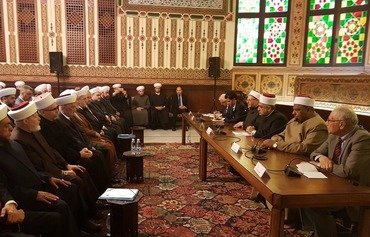The Lebanese model of co-existence and citizenship was a key topic of discussion at a recent conference in Cairo hosted by Al-Azhar and the Muslim Council of Elders.
Participants at the " Freedom and Citizenship: Diversity and Integration " conference, held February 28th to March 1st, explored the possibility of moving away from the majority-minority model in favour of a state based on citizenship.
This lays the foundation for a new concept of statehood in the Middle East, conference participants told Al-Mashareq, with Lebanon serving as an example of how this might function in practice.
The conference represented "a quantum leap in terms of the substantive dialogue that took place between Muslims and Christians", said Sheikh Khaldoun Oraymet, secretary general of the Lebanese Higher Islamic Council.
An initiative of the Grand Imam of Al-Azhar and head of the Muslim Council of Elders, Ahmed al-Tayeb, the conference brought together senior clerics from more than 60 countries.
It "emphasised the meanings and fundamental principles of the Muslim and Christian doctrines which call for compassion and love between man and his brother man", Oraymet told Al-Mashareq.
At the request of Al-Azhar, Lebanon was represented by the largest delegation, comprising 60 religious and secular figures, he said.
This was intended as a means of sharing "the benefit of the many positives of our co-existence, which places a great responsibility upon us", Oraymet said.
"Hence politicians, religious authorities, writers, thinkers and all Lebanese must solidify this co-existence and get out of the caves of denominationalism and quagmires of sectarianism," he said.
They must embrace the concept of citizenship that brings people together, because the homeland is for everyone, as stated by the recommendations put forth by the conference, he added.
Sharing Lebanon’s experience
"The Lebanese must benefit from and develop their experience with co-existence," Oraymet said. "Our mission, as Lebanese, is to deepen citizenship and live it."
Citizenship can "serve as a practical response to the calls for intolerance, extremism and fanaticism by the followers of all denominations and sects", he said.
The conference recommended the establishment of a new partnership to advance the concept of citizenship.
"We Lebanese bear a great responsibility on the Arab and international levels, because our model of life is not ours, but rather belongs to the Arab-Islamic nation and human society as a whole," Oraymet said.
"The key elements of the recommendations centre on respect for and recognition of others and finding common denominators with them to build upon," he said.
"This means that the followers of the various religions and cultures would live within a diverse integrated and co-operative community," he said, adding that there is no place for "narrow-mindedness, intolerance and extremism".
Conference participants supported the idea that "the national interest requires that we all transition to the concepts of citizenship, diversity and integration in citizenship for the benefit of the nation and humanity", he added.
Citizenship amid differences
The abolition of the majority-minority concept comes in favor of the concept of citizenship and equality among citizens, regardless of their religious, sectarian and ethnic differences, said Islamic-Christian National Dialogue Committee member Mohammed al-Sammak, who serves as an adviser to Lebanon's Grand Mufti.
"Today, we are seeing a very fundamental shift in relations in the Middle East, as it is the first time that the Grand Imam of Al-Azhar speaks of the abolition of the concept of minorities from our political narrative," he told Al-Mashareq.
The old concepts are falling away in favour of the adoption of citizenship and a national state in which citizens are equal, al-Sammak said.
The conference included Sunni and Shia Muslims and Christians of all denominations with the active participation of international church councils and the Vatican.
It served as "a major turning point in countering terrorist ideology and the elimination of discrimination", he added.
"We in Lebanon established a civil state, albeit not a perfect one, to preserve our national unity," al-Sammak said.
The Al-Azhar conference "helps us to be actual bearers of a message, and gave us a new impetus to evolve and live up to the message, which is the essence of Lebanon’s existence", he said.
Lebanese universities foster dialogue
At the conference, all Lebanese participants used "very similar terms to speak of openness, co-existence, freedoms and citizenship", said Fadia Kiwan, former dean of the faculty of political science at Saint Joseph University.
"We showcased Lebanon because it embodies convergence and co-existence despite the fact we are facing a political crisis," she said.
"It is imperative that Lebanon succeeds with its co-existence on the political level to present itself to the world as a model," Kiwan added.
Most private Lebanese universities are working to foster dialogue among students of different religious, sectarian and political affiliations , she said, "with the aim of achieving convergence on controversial topics".
"We always create joint spaces on all topics to put our students at the heart of co-existence, this stemming from our faith in our experiment and awareness of the importance of strengthening and propagating it," she added.

![Clerics and religious leaders attend an international conference in Cairo held by Al-Azhar and the Muslim Council of Elders from February 28th to March 1st. [Photo courtesy of the Executive Committee of the Democratic Renewal Movement]](/cnmi_am/images/2017/03/20/7482-azhar-islamic-conference-600_384.jpg)





